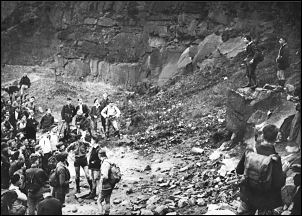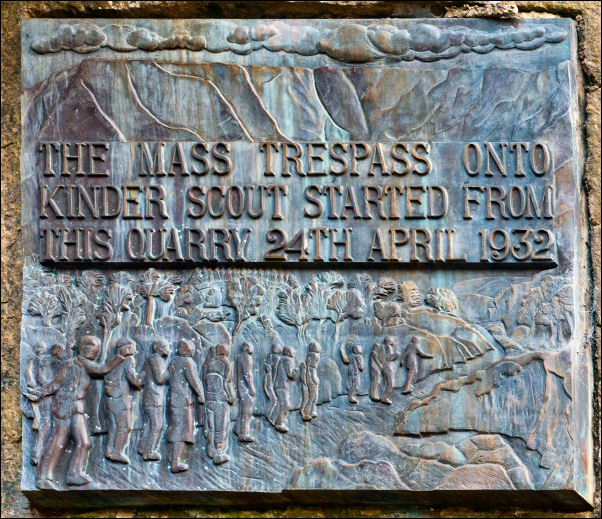|
Tue 14 Jun 2016
Keith Warrender – The
Battle for Kinder Scout. |
|
|
Keith gave us very comprehensive
explanation of the background to the
Mass Trespass of Kinder Scout, Derbyshire that occurred on
24th Apr 1932 which started a chain of events that lead to the
opening up of much of what was previously common land and taken
by the Enclosures Acts to deny access. We now take it for
granted that we can walk the hill unhindered, but it wasn’t
always so.
It was not the first or last Mass Trespass but was
the most significant. Even near Chorley there was a Mass
Trespass of the Winter Hill area in 1896 where the public access
was also denied.
Kinder Scout is a large area of high
moorland between the Manchester area to the west and Sheffield
to the east. During the 1930s many rambling groups were active
in both areas but their access to the best walking areas were
denied. In some circumstance it was possible to access specific
area with written permission. |

Keith Warrender |
|
Historically the area was Common Land but seized by the rich and
powerful under the Enclosures Act in 1840. In 1872 the
Manchester Guardian printed a report of a rambler being beaten
by a gamekeeper. The landowner wanted to keep the moors for
grouse shooting only. The Water Board were also involved as they
wanted to restrict access as it was partially a water catchment.
The owners were under the impression that trespass was against
the law, which it wasn’t as trespass is a civil offence and you
can only be sued for it. |

Some of Keith's books |
|
In 1923 a photograph of a rambler had been taken and published
by the landowners in the Manchester Newspapers with a £5 reward
offered to anyone who would identify him. Nobody claimed the
reward which wasn’t surprising as the rambler was from
Sheffield.
During one of the many camps held by the various
rambling groups it was decided to hold a mass trespass and
advertise the event to be sure of maximum attendance. One of the
main organisers was Benny Rothman (1911-2002) who was only 21
years old at the time. |

Bowden
Bridge Quarry assembly 1932 |

Memorial plaque at Bowden Bridge |
Benny had been a personal friend of
our speaker Keith so we were able to hear first-hand accounts of
the events. The Authorities decided that they would crush the
rebellion before it started and put police on guard at Hayfield
Railway Stations to apprehend Benny when he arrived.
Unknown to them he didn’t want to
spend money on a rail ticket so cycled there from his home in
Timperley. He walked to Bowden Bridge Quarry with his friend
Wolfie to her a speech by Jack Clayton about the day. About 400
people had turned up and Jack bottled-out. Amongst the crowd was
the historian A.J.P.Taylor and Sir Michael Tippet. Benny Rothman
had to take over and gave an introduction before marching
peacefully up through William Clough. There they saw a line of
gamekeepers with sticks. An innocent walker was coming down the
Clough from the other way and knew nothing of the trespass. The
marchers thought he was one of them and waved. On seeing this
the gamekeepers assumed the lone walker was a trespasser,
approached him and beat him to the ground. |

|
|
Some gamekeepers had their sticks taken
from them, broken on two and handed back. There were also
several scuffles. The walkers continued up onto high ground,
claimed a victory and returned to Hayfield.
The Police were
waiting and arrested several who they though were the
ringleaders. They included one man who didn’t even agree to the
trespass.
The group was brought before the Derby Assizes.
A Grand Jury of two brigadier generals, three colonels, two
majors, three captains, two aldermen and eleven country
gentlemen considered their case.
There was not a single
working class person and no rambler amongst the jury.
This is
hardly a fair jury.
They were charged with riotous assembly
and assault of a gamekeeper.
The sentences were:
Harry
Mendel - discharged
Benny Rothman - 4 months
Tony Gillett
- 2 months
Dave Nesbitt - 3 months
Jud Clyne - 2 months
John Anderson - 6 months
The repercussion were far
reaching and the Authorities realised their mistake on arrests
etc.
It can be argued that the events of 1932 lead to the
‘Access to Mountains Act’ and further acts that opened up our
countryside.
We owe a great debt to Benny and those brave 400
protesters.
The Manchester Rambler folksong was written by
Ewan MacColl in 1932, the same year as the trespass.
The
chorus is:
I'm a rambler, I'm a rambler from Manchester way
I get all my pleasure the hard moorland way
I may be a wage
slave on Monday
But I am a free man on Sunday
B.H. |




